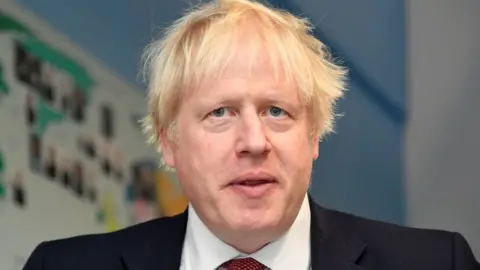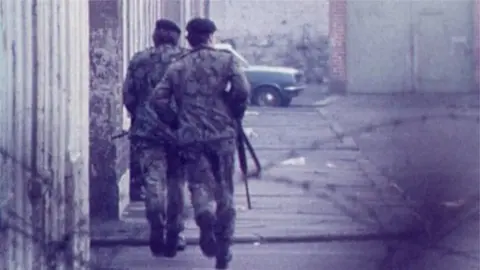Troubles legacy: Ending all prosecutions would be 'wrong'
 Toby Melville/pa
Toby Melville/paA move to end all Troubles prosecutions following the collapse of high-profile cases would be fundamentally wrong, a victims' group has said.
Doubts have been raised about the viability of future legacy cases.
Wave, Northern Ireland's largest cross-community victims' group, has written to Boris Johnson opposing any "de-facto amnesty".
It comes after prosecutors stopped the trial of two Army veterans facing murder charges.
Soldier F was to be prosecuted over the deaths of James Wray and William McKinney on Bloody Sunday.
The case against Soldier B relates to the death of 15-year-old Daniel Hegarty, who was shot twice in the head in Londonderry in July 1972, and the wounding of his cousin, Christopher.
Thirteen people were shot dead and 15 were wounded when the Parachute Regiment opened fire on civil rights demonstrators on Bloody Sunday in Derry in January 1972.
Soldier F was also facing five counts of attempted murder.
Their trials were unable to proceed due to issues around the admissibility of evidence.
'De facto amnesty'
Details of "short and focused" multi-party talks on dealing with the legacy of the Troubles have been announced by the Northern Ireland Office (NIO).
The talks will aim "to find an agreed way forward" which will lead to legislation being introduced by the end of autumn, the NIO has said. The talks will include input from victims and survivors.
In May, newspapers reported the government intended to ban future prosecutions of British soldiers who served in Northern Ireland.
Details of the leaked plan said it proposed all prosecutions prior to 1998 and related to the Troubles will, in future, be banned under a statute of limitations. It would also apply to former paramilitaries.
Instead the focus will be on "information recovery" for families of those killed.
Shortly after the reports, the Queen's Speech included a commitment by the government to bring forward legislation to deal with Troubles-related prosecutions.

In the letter, Wave says pushing ahead with a de facto amnesty would show how little government departments understood "the nature of the pain and trauma which continues to be suffered by victims and survivors and their families".
"The majority of victims and survivors are only too aware that the chances of securing a conviction for crimes that are decades old are beyond remote," says the letter.
"But to deny them even that possibility by perverting the criminal justice system cannot be right in a country that prides itself on adherence to the rule of law."
It goes on to ask if victims of other atrocities, including the 7/7 bombing in London and the Manchester bombing in 2017, would be asked "to draw a line under their own grief and pursuit of justice?"
Future prosecutions
Speaking on Sunday, Northern Ireland Justice Minister Naomi Long said the recent collapse of the cases against Soldier B and Soldier F does not mean future cases should not go ahead.
She said the circumstances which led to the prosecutions not being continued were specific, and would not apply to all legacy cases.
The shadow Northern Ireland Secretary, Labour's Louise Haigh, said the government had given victims their word that they would deliver "proper investigations denied to victims and their families for so long".
"Reports suggest they want to tear that pledge up, and with it cruelly deny families the chance of finding the truth about what happened to their loved ones," she said.
In 2019, the Public Prosecution Service in Northern Ireland said of 32 "legacy cases" it had ruled on since 2012, 17 related to republicans, eight to loyalists, and five were connected to the Army.
